Financial Accounting Theory Report: CSR Disclosure and Audit Committee
VerifiedAdded on 2021/09/16
|9
|1853
|227
Report
AI Summary
This report delves into financial accounting theory, specifically examining the influence of audit committees on corporate social responsibility (CSR) disclosure within the context of Australian corporations. It begins with an introduction to the topic, followed by an exploration of stakeholder theory from a managerial perspective, emphasizing the significance of CSR disclosure. The report then analyzes the role of the audit committee in overseeing regulatory compliance, financial reporting, and CSR reporting, including social initiatives and the allocation of profits for CSR purposes. The importance of improving internal and external audits, along with the recommendations and suggestions made by the audit committee, are also discussed. The report concludes by highlighting the substantial impact of audit committees on an entity's compliance with CSR requirements, offering valuable insights into the intersection of financial accounting and corporate responsibility.
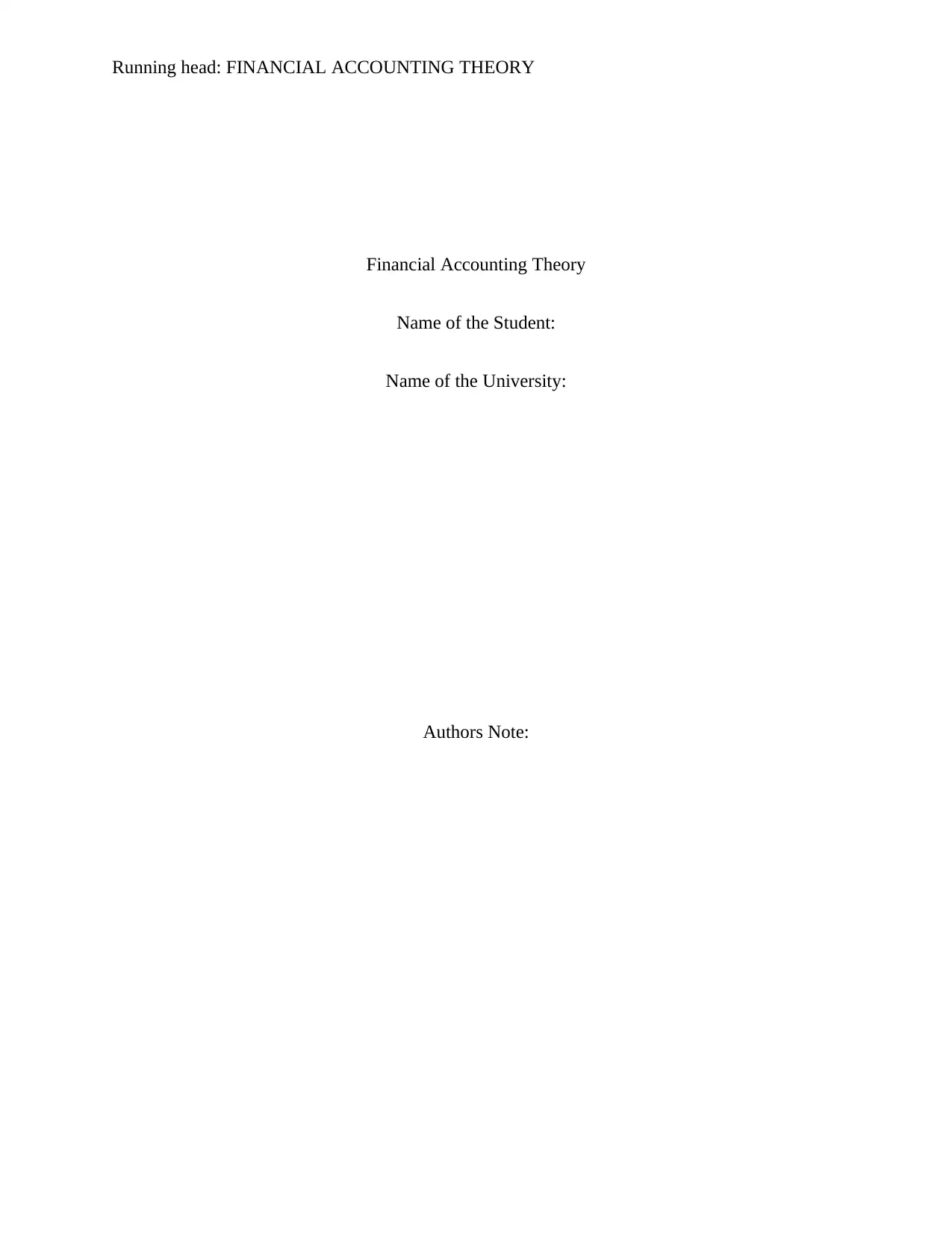
Running head: FINANCIAL ACCOUNTING THEORY
Financial Accounting Theory
Name of the Student:
Name of the University:
Authors Note:
Financial Accounting Theory
Name of the Student:
Name of the University:
Authors Note:
Paraphrase This Document
Need a fresh take? Get an instant paraphrase of this document with our AI Paraphraser
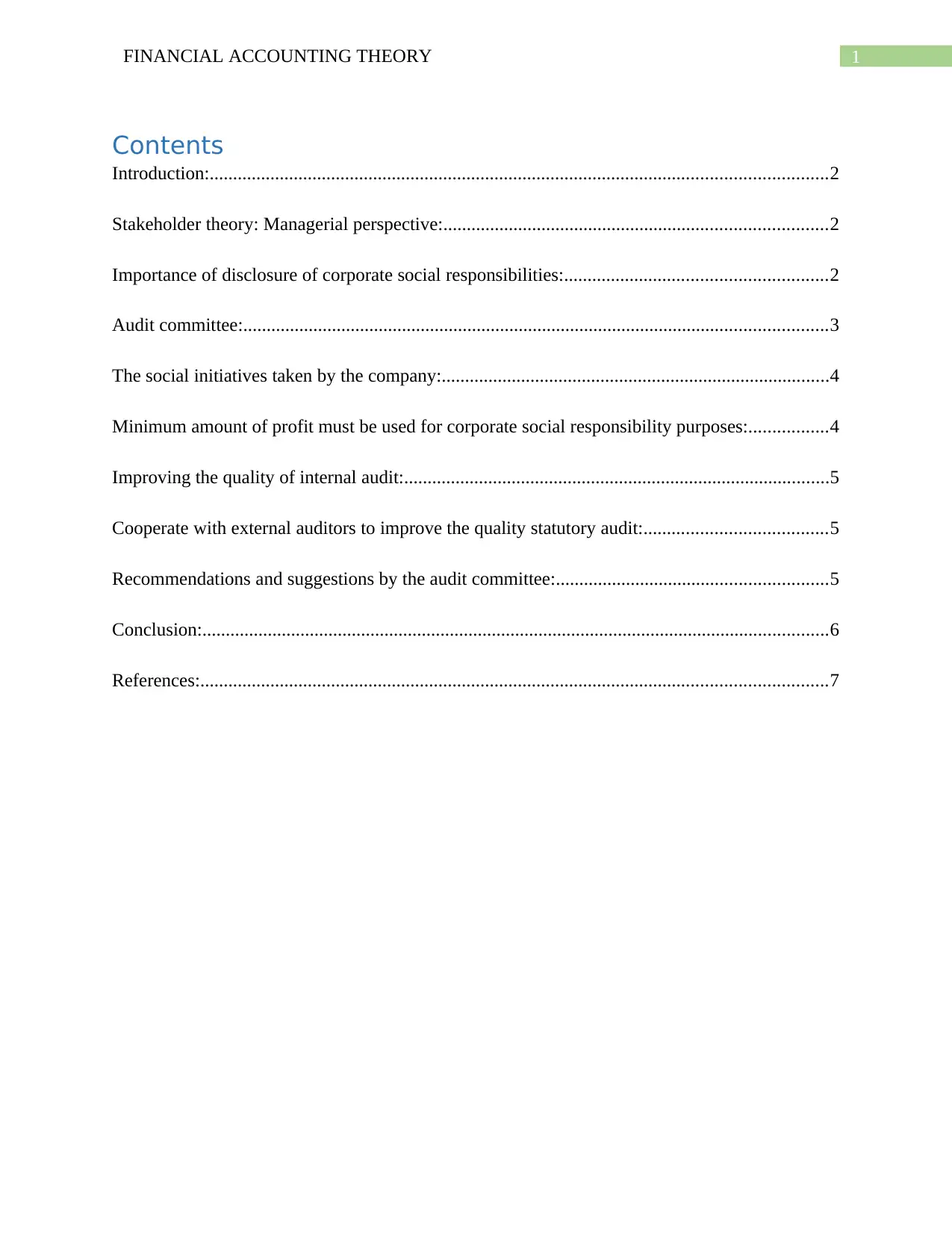
1FINANCIAL ACCOUNTING THEORY
Contents
Introduction:....................................................................................................................................2
Stakeholder theory: Managerial perspective:..................................................................................2
Importance of disclosure of corporate social responsibilities:........................................................2
Audit committee:.............................................................................................................................3
The social initiatives taken by the company:...................................................................................4
Minimum amount of profit must be used for corporate social responsibility purposes:.................4
Improving the quality of internal audit:...........................................................................................5
Cooperate with external auditors to improve the quality statutory audit:.......................................5
Recommendations and suggestions by the audit committee:..........................................................5
Conclusion:......................................................................................................................................6
References:......................................................................................................................................7
Contents
Introduction:....................................................................................................................................2
Stakeholder theory: Managerial perspective:..................................................................................2
Importance of disclosure of corporate social responsibilities:........................................................2
Audit committee:.............................................................................................................................3
The social initiatives taken by the company:...................................................................................4
Minimum amount of profit must be used for corporate social responsibility purposes:.................4
Improving the quality of internal audit:...........................................................................................5
Cooperate with external auditors to improve the quality statutory audit:.......................................5
Recommendations and suggestions by the audit committee:..........................................................5
Conclusion:......................................................................................................................................6
References:......................................................................................................................................7
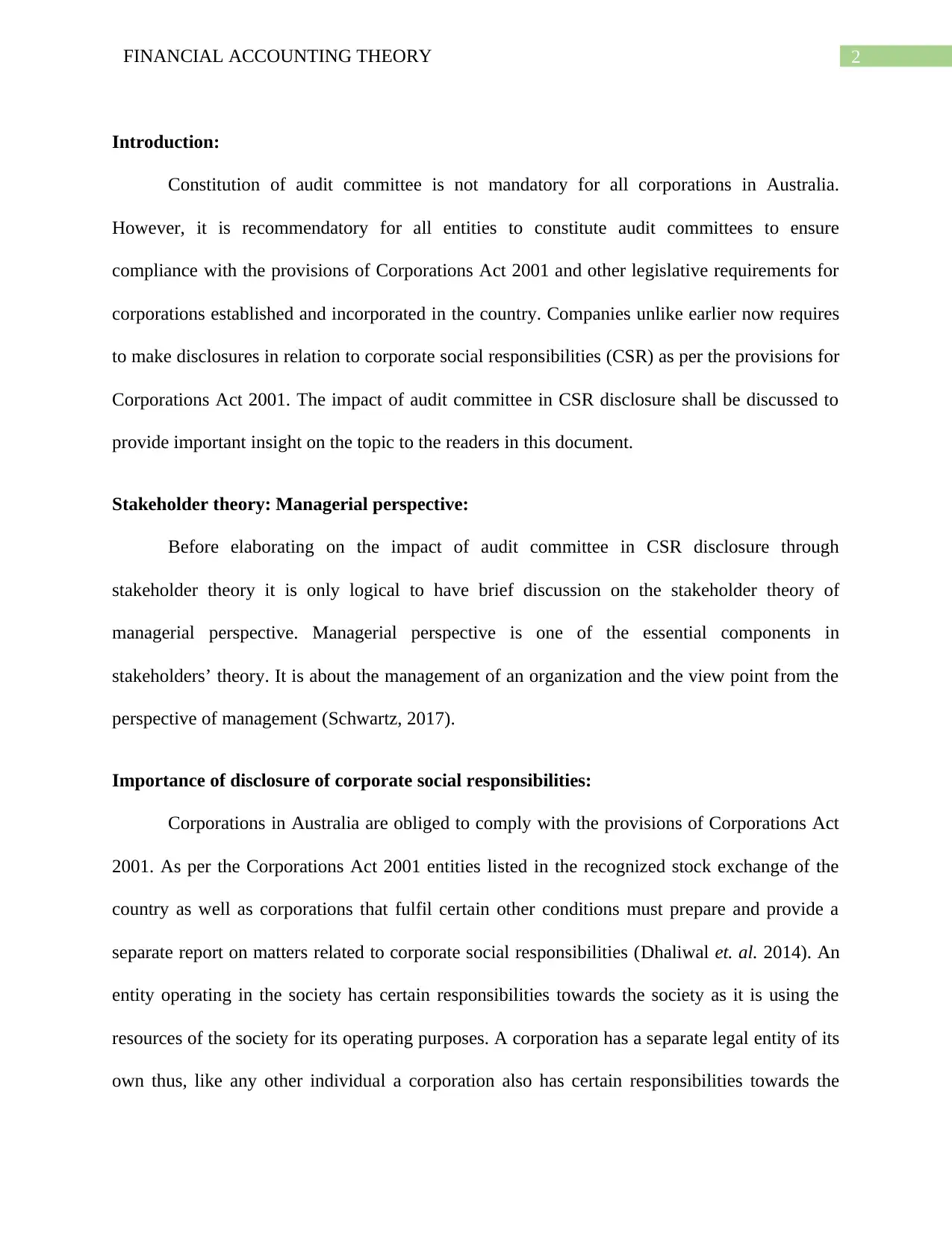
2FINANCIAL ACCOUNTING THEORY
Introduction:
Constitution of audit committee is not mandatory for all corporations in Australia.
However, it is recommendatory for all entities to constitute audit committees to ensure
compliance with the provisions of Corporations Act 2001 and other legislative requirements for
corporations established and incorporated in the country. Companies unlike earlier now requires
to make disclosures in relation to corporate social responsibilities (CSR) as per the provisions for
Corporations Act 2001. The impact of audit committee in CSR disclosure shall be discussed to
provide important insight on the topic to the readers in this document.
Stakeholder theory: Managerial perspective:
Before elaborating on the impact of audit committee in CSR disclosure through
stakeholder theory it is only logical to have brief discussion on the stakeholder theory of
managerial perspective. Managerial perspective is one of the essential components in
stakeholders’ theory. It is about the management of an organization and the view point from the
perspective of management (Schwartz, 2017).
Importance of disclosure of corporate social responsibilities:
Corporations in Australia are obliged to comply with the provisions of Corporations Act
2001. As per the Corporations Act 2001 entities listed in the recognized stock exchange of the
country as well as corporations that fulfil certain other conditions must prepare and provide a
separate report on matters related to corporate social responsibilities (Dhaliwal et. al. 2014). An
entity operating in the society has certain responsibilities towards the society as it is using the
resources of the society for its operating purposes. A corporation has a separate legal entity of its
own thus, like any other individual a corporation also has certain responsibilities towards the
Introduction:
Constitution of audit committee is not mandatory for all corporations in Australia.
However, it is recommendatory for all entities to constitute audit committees to ensure
compliance with the provisions of Corporations Act 2001 and other legislative requirements for
corporations established and incorporated in the country. Companies unlike earlier now requires
to make disclosures in relation to corporate social responsibilities (CSR) as per the provisions for
Corporations Act 2001. The impact of audit committee in CSR disclosure shall be discussed to
provide important insight on the topic to the readers in this document.
Stakeholder theory: Managerial perspective:
Before elaborating on the impact of audit committee in CSR disclosure through
stakeholder theory it is only logical to have brief discussion on the stakeholder theory of
managerial perspective. Managerial perspective is one of the essential components in
stakeholders’ theory. It is about the management of an organization and the view point from the
perspective of management (Schwartz, 2017).
Importance of disclosure of corporate social responsibilities:
Corporations in Australia are obliged to comply with the provisions of Corporations Act
2001. As per the Corporations Act 2001 entities listed in the recognized stock exchange of the
country as well as corporations that fulfil certain other conditions must prepare and provide a
separate report on matters related to corporate social responsibilities (Dhaliwal et. al. 2014). An
entity operating in the society has certain responsibilities towards the society as it is using the
resources of the society for its operating purposes. A corporation has a separate legal entity of its
own thus, like any other individual a corporation also has certain responsibilities towards the
⊘ This is a preview!⊘
Do you want full access?
Subscribe today to unlock all pages.

Trusted by 1+ million students worldwide
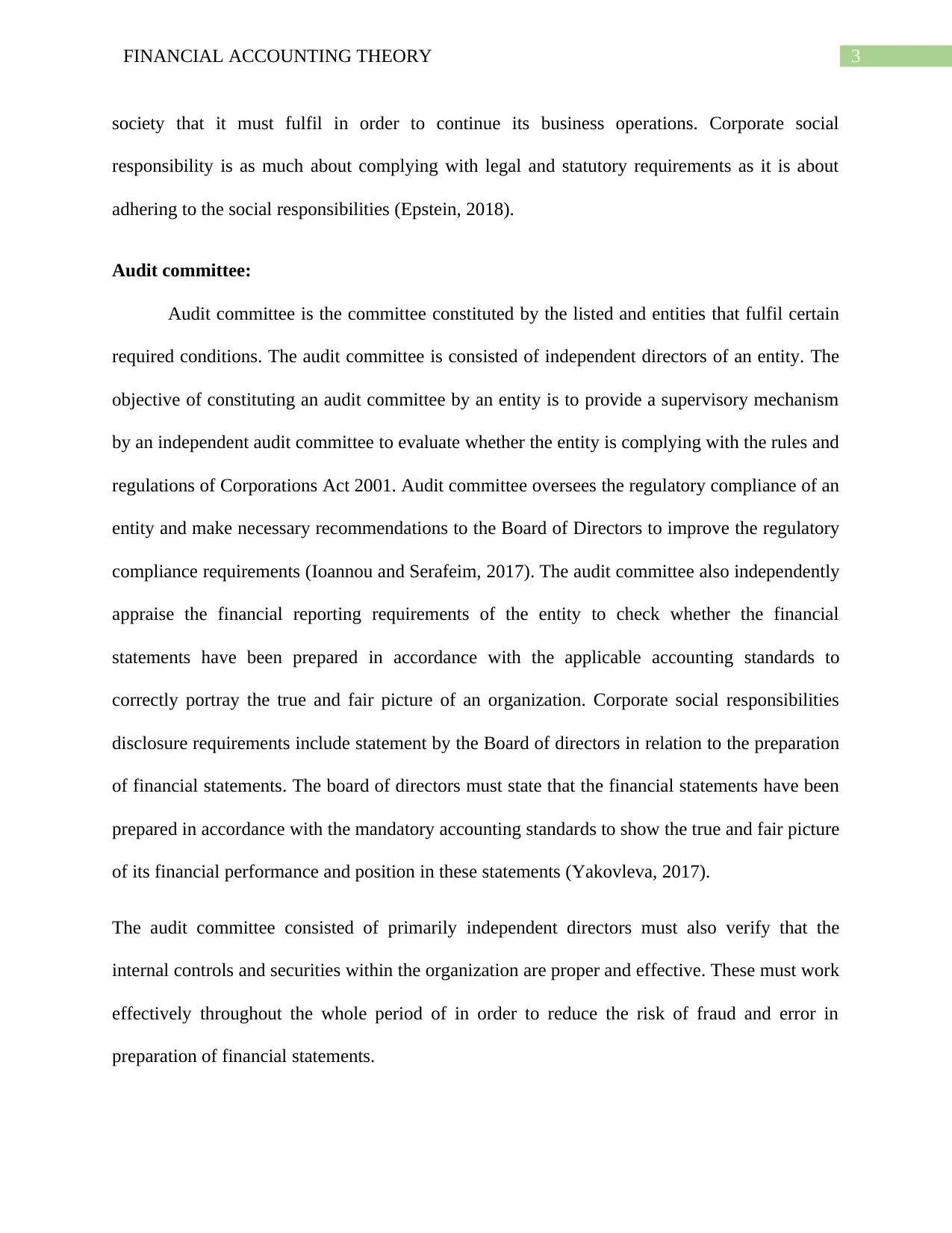
3FINANCIAL ACCOUNTING THEORY
society that it must fulfil in order to continue its business operations. Corporate social
responsibility is as much about complying with legal and statutory requirements as it is about
adhering to the social responsibilities (Epstein, 2018).
Audit committee:
Audit committee is the committee constituted by the listed and entities that fulfil certain
required conditions. The audit committee is consisted of independent directors of an entity. The
objective of constituting an audit committee by an entity is to provide a supervisory mechanism
by an independent audit committee to evaluate whether the entity is complying with the rules and
regulations of Corporations Act 2001. Audit committee oversees the regulatory compliance of an
entity and make necessary recommendations to the Board of Directors to improve the regulatory
compliance requirements (Ioannou and Serafeim, 2017). The audit committee also independently
appraise the financial reporting requirements of the entity to check whether the financial
statements have been prepared in accordance with the applicable accounting standards to
correctly portray the true and fair picture of an organization. Corporate social responsibilities
disclosure requirements include statement by the Board of directors in relation to the preparation
of financial statements. The board of directors must state that the financial statements have been
prepared in accordance with the mandatory accounting standards to show the true and fair picture
of its financial performance and position in these statements (Yakovleva, 2017).
The audit committee consisted of primarily independent directors must also verify that the
internal controls and securities within the organization are proper and effective. These must work
effectively throughout the whole period of in order to reduce the risk of fraud and error in
preparation of financial statements.
society that it must fulfil in order to continue its business operations. Corporate social
responsibility is as much about complying with legal and statutory requirements as it is about
adhering to the social responsibilities (Epstein, 2018).
Audit committee:
Audit committee is the committee constituted by the listed and entities that fulfil certain
required conditions. The audit committee is consisted of independent directors of an entity. The
objective of constituting an audit committee by an entity is to provide a supervisory mechanism
by an independent audit committee to evaluate whether the entity is complying with the rules and
regulations of Corporations Act 2001. Audit committee oversees the regulatory compliance of an
entity and make necessary recommendations to the Board of Directors to improve the regulatory
compliance requirements (Ioannou and Serafeim, 2017). The audit committee also independently
appraise the financial reporting requirements of the entity to check whether the financial
statements have been prepared in accordance with the applicable accounting standards to
correctly portray the true and fair picture of an organization. Corporate social responsibilities
disclosure requirements include statement by the Board of directors in relation to the preparation
of financial statements. The board of directors must state that the financial statements have been
prepared in accordance with the mandatory accounting standards to show the true and fair picture
of its financial performance and position in these statements (Yakovleva, 2017).
The audit committee consisted of primarily independent directors must also verify that the
internal controls and securities within the organization are proper and effective. These must work
effectively throughout the whole period of in order to reduce the risk of fraud and error in
preparation of financial statements.
Paraphrase This Document
Need a fresh take? Get an instant paraphrase of this document with our AI Paraphraser
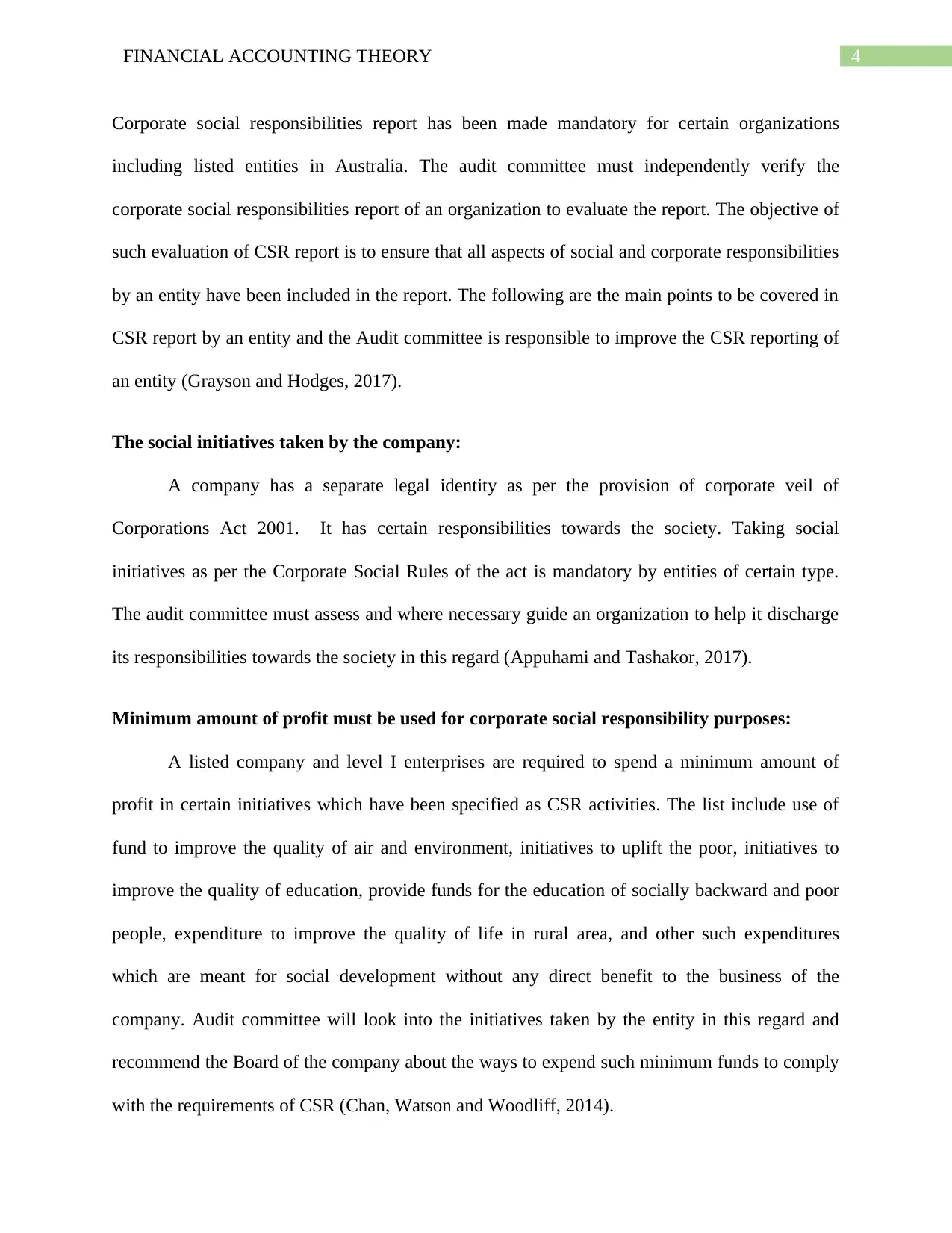
4FINANCIAL ACCOUNTING THEORY
Corporate social responsibilities report has been made mandatory for certain organizations
including listed entities in Australia. The audit committee must independently verify the
corporate social responsibilities report of an organization to evaluate the report. The objective of
such evaluation of CSR report is to ensure that all aspects of social and corporate responsibilities
by an entity have been included in the report. The following are the main points to be covered in
CSR report by an entity and the Audit committee is responsible to improve the CSR reporting of
an entity (Grayson and Hodges, 2017).
The social initiatives taken by the company:
A company has a separate legal identity as per the provision of corporate veil of
Corporations Act 2001. It has certain responsibilities towards the society. Taking social
initiatives as per the Corporate Social Rules of the act is mandatory by entities of certain type.
The audit committee must assess and where necessary guide an organization to help it discharge
its responsibilities towards the society in this regard (Appuhami and Tashakor, 2017).
Minimum amount of profit must be used for corporate social responsibility purposes:
A listed company and level I enterprises are required to spend a minimum amount of
profit in certain initiatives which have been specified as CSR activities. The list include use of
fund to improve the quality of air and environment, initiatives to uplift the poor, initiatives to
improve the quality of education, provide funds for the education of socially backward and poor
people, expenditure to improve the quality of life in rural area, and other such expenditures
which are meant for social development without any direct benefit to the business of the
company. Audit committee will look into the initiatives taken by the entity in this regard and
recommend the Board of the company about the ways to expend such minimum funds to comply
with the requirements of CSR (Chan, Watson and Woodliff, 2014).
Corporate social responsibilities report has been made mandatory for certain organizations
including listed entities in Australia. The audit committee must independently verify the
corporate social responsibilities report of an organization to evaluate the report. The objective of
such evaluation of CSR report is to ensure that all aspects of social and corporate responsibilities
by an entity have been included in the report. The following are the main points to be covered in
CSR report by an entity and the Audit committee is responsible to improve the CSR reporting of
an entity (Grayson and Hodges, 2017).
The social initiatives taken by the company:
A company has a separate legal identity as per the provision of corporate veil of
Corporations Act 2001. It has certain responsibilities towards the society. Taking social
initiatives as per the Corporate Social Rules of the act is mandatory by entities of certain type.
The audit committee must assess and where necessary guide an organization to help it discharge
its responsibilities towards the society in this regard (Appuhami and Tashakor, 2017).
Minimum amount of profit must be used for corporate social responsibility purposes:
A listed company and level I enterprises are required to spend a minimum amount of
profit in certain initiatives which have been specified as CSR activities. The list include use of
fund to improve the quality of air and environment, initiatives to uplift the poor, initiatives to
improve the quality of education, provide funds for the education of socially backward and poor
people, expenditure to improve the quality of life in rural area, and other such expenditures
which are meant for social development without any direct benefit to the business of the
company. Audit committee will look into the initiatives taken by the entity in this regard and
recommend the Board of the company about the ways to expend such minimum funds to comply
with the requirements of CSR (Chan, Watson and Woodliff, 2014).
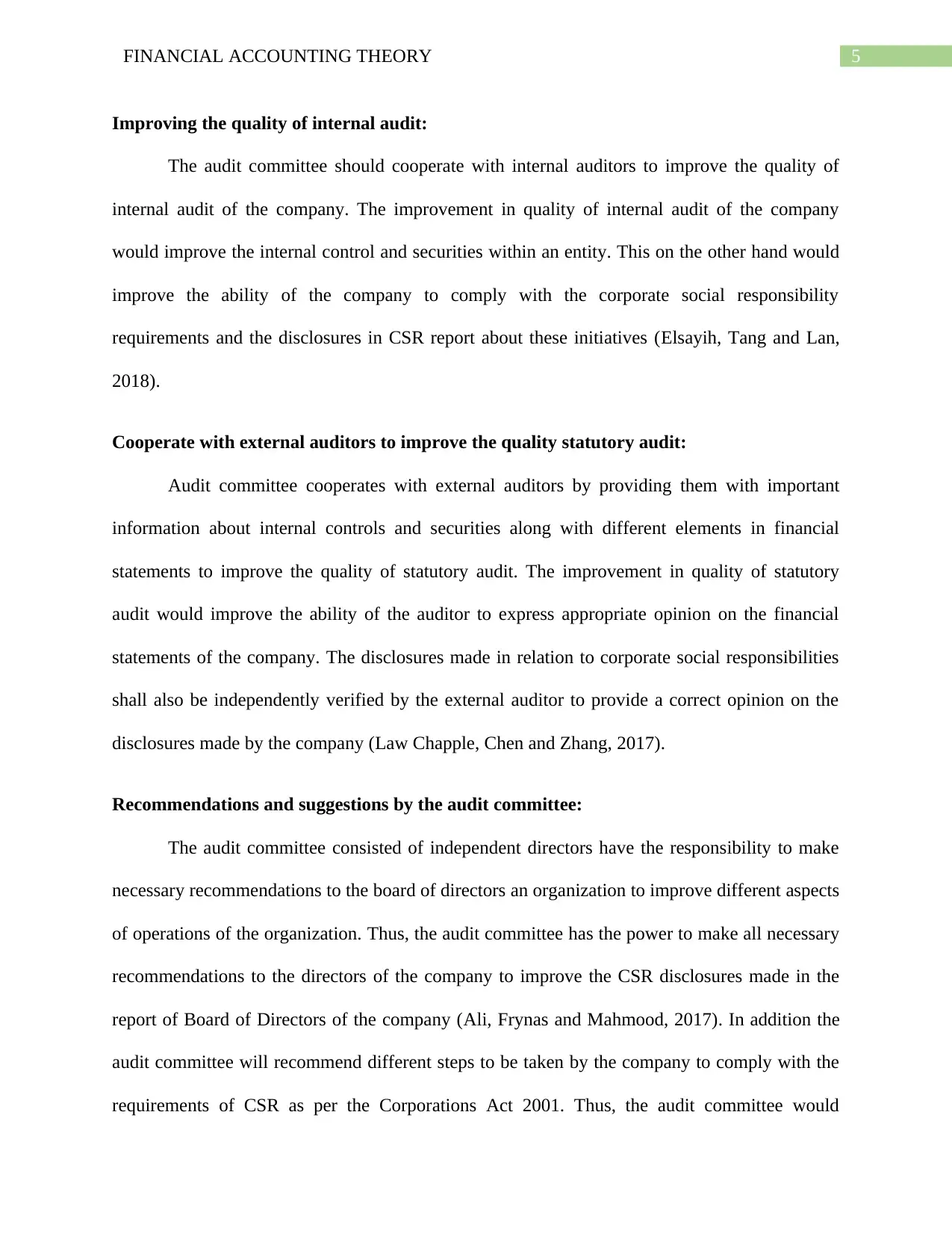
5FINANCIAL ACCOUNTING THEORY
Improving the quality of internal audit:
The audit committee should cooperate with internal auditors to improve the quality of
internal audit of the company. The improvement in quality of internal audit of the company
would improve the internal control and securities within an entity. This on the other hand would
improve the ability of the company to comply with the corporate social responsibility
requirements and the disclosures in CSR report about these initiatives (Elsayih, Tang and Lan,
2018).
Cooperate with external auditors to improve the quality statutory audit:
Audit committee cooperates with external auditors by providing them with important
information about internal controls and securities along with different elements in financial
statements to improve the quality of statutory audit. The improvement in quality of statutory
audit would improve the ability of the auditor to express appropriate opinion on the financial
statements of the company. The disclosures made in relation to corporate social responsibilities
shall also be independently verified by the external auditor to provide a correct opinion on the
disclosures made by the company (Law Chapple, Chen and Zhang, 2017).
Recommendations and suggestions by the audit committee:
The audit committee consisted of independent directors have the responsibility to make
necessary recommendations to the board of directors an organization to improve different aspects
of operations of the organization. Thus, the audit committee has the power to make all necessary
recommendations to the directors of the company to improve the CSR disclosures made in the
report of Board of Directors of the company (Ali, Frynas and Mahmood, 2017). In addition the
audit committee will recommend different steps to be taken by the company to comply with the
requirements of CSR as per the Corporations Act 2001. Thus, the audit committee would
Improving the quality of internal audit:
The audit committee should cooperate with internal auditors to improve the quality of
internal audit of the company. The improvement in quality of internal audit of the company
would improve the internal control and securities within an entity. This on the other hand would
improve the ability of the company to comply with the corporate social responsibility
requirements and the disclosures in CSR report about these initiatives (Elsayih, Tang and Lan,
2018).
Cooperate with external auditors to improve the quality statutory audit:
Audit committee cooperates with external auditors by providing them with important
information about internal controls and securities along with different elements in financial
statements to improve the quality of statutory audit. The improvement in quality of statutory
audit would improve the ability of the auditor to express appropriate opinion on the financial
statements of the company. The disclosures made in relation to corporate social responsibilities
shall also be independently verified by the external auditor to provide a correct opinion on the
disclosures made by the company (Law Chapple, Chen and Zhang, 2017).
Recommendations and suggestions by the audit committee:
The audit committee consisted of independent directors have the responsibility to make
necessary recommendations to the board of directors an organization to improve different aspects
of operations of the organization. Thus, the audit committee has the power to make all necessary
recommendations to the directors of the company to improve the CSR disclosures made in the
report of Board of Directors of the company (Ali, Frynas and Mahmood, 2017). In addition the
audit committee will recommend different steps to be taken by the company to comply with the
requirements of CSR as per the Corporations Act 2001. Thus, the audit committee would
⊘ This is a preview!⊘
Do you want full access?
Subscribe today to unlock all pages.

Trusted by 1+ million students worldwide
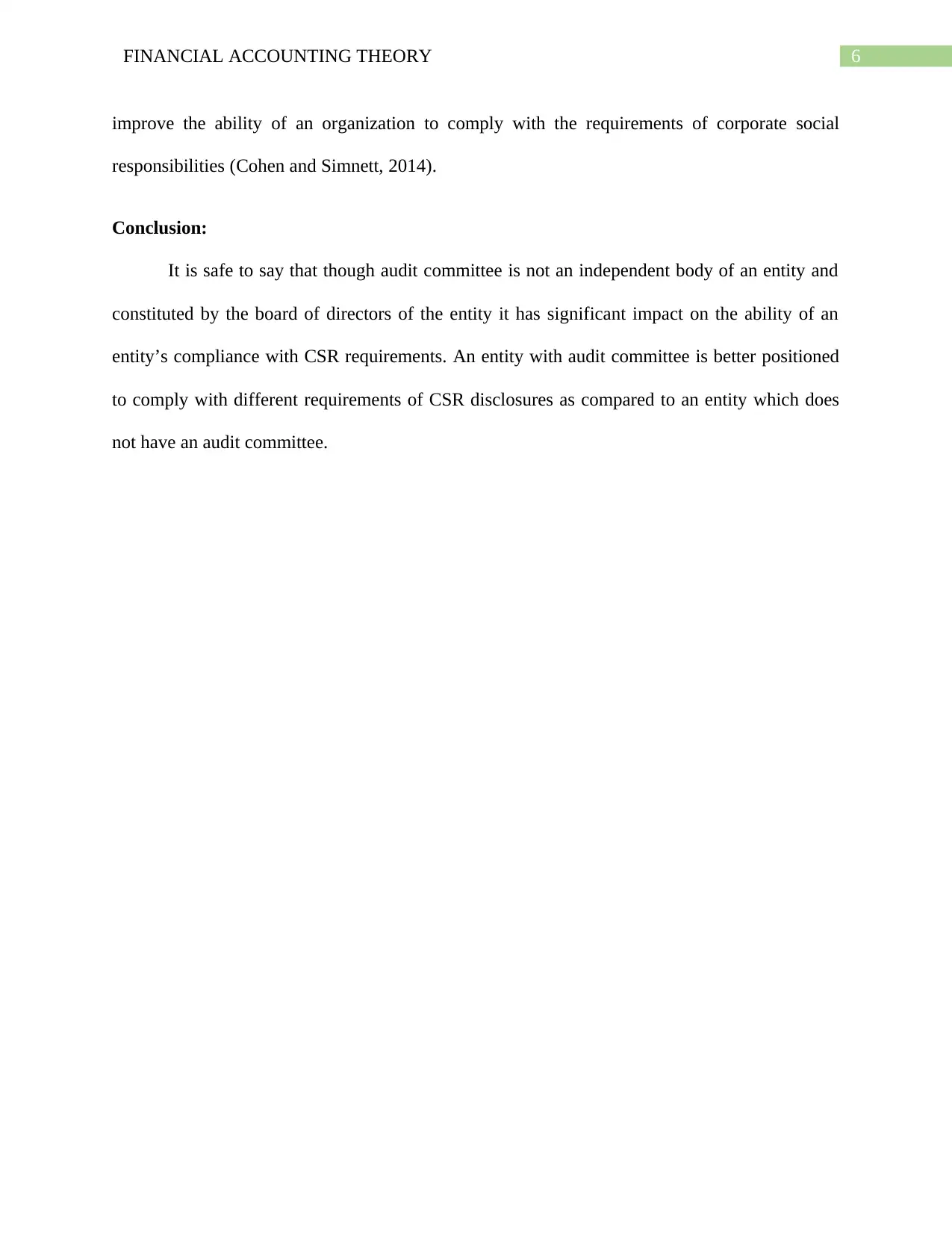
6FINANCIAL ACCOUNTING THEORY
improve the ability of an organization to comply with the requirements of corporate social
responsibilities (Cohen and Simnett, 2014).
Conclusion:
It is safe to say that though audit committee is not an independent body of an entity and
constituted by the board of directors of the entity it has significant impact on the ability of an
entity’s compliance with CSR requirements. An entity with audit committee is better positioned
to comply with different requirements of CSR disclosures as compared to an entity which does
not have an audit committee.
improve the ability of an organization to comply with the requirements of corporate social
responsibilities (Cohen and Simnett, 2014).
Conclusion:
It is safe to say that though audit committee is not an independent body of an entity and
constituted by the board of directors of the entity it has significant impact on the ability of an
entity’s compliance with CSR requirements. An entity with audit committee is better positioned
to comply with different requirements of CSR disclosures as compared to an entity which does
not have an audit committee.
Paraphrase This Document
Need a fresh take? Get an instant paraphrase of this document with our AI Paraphraser
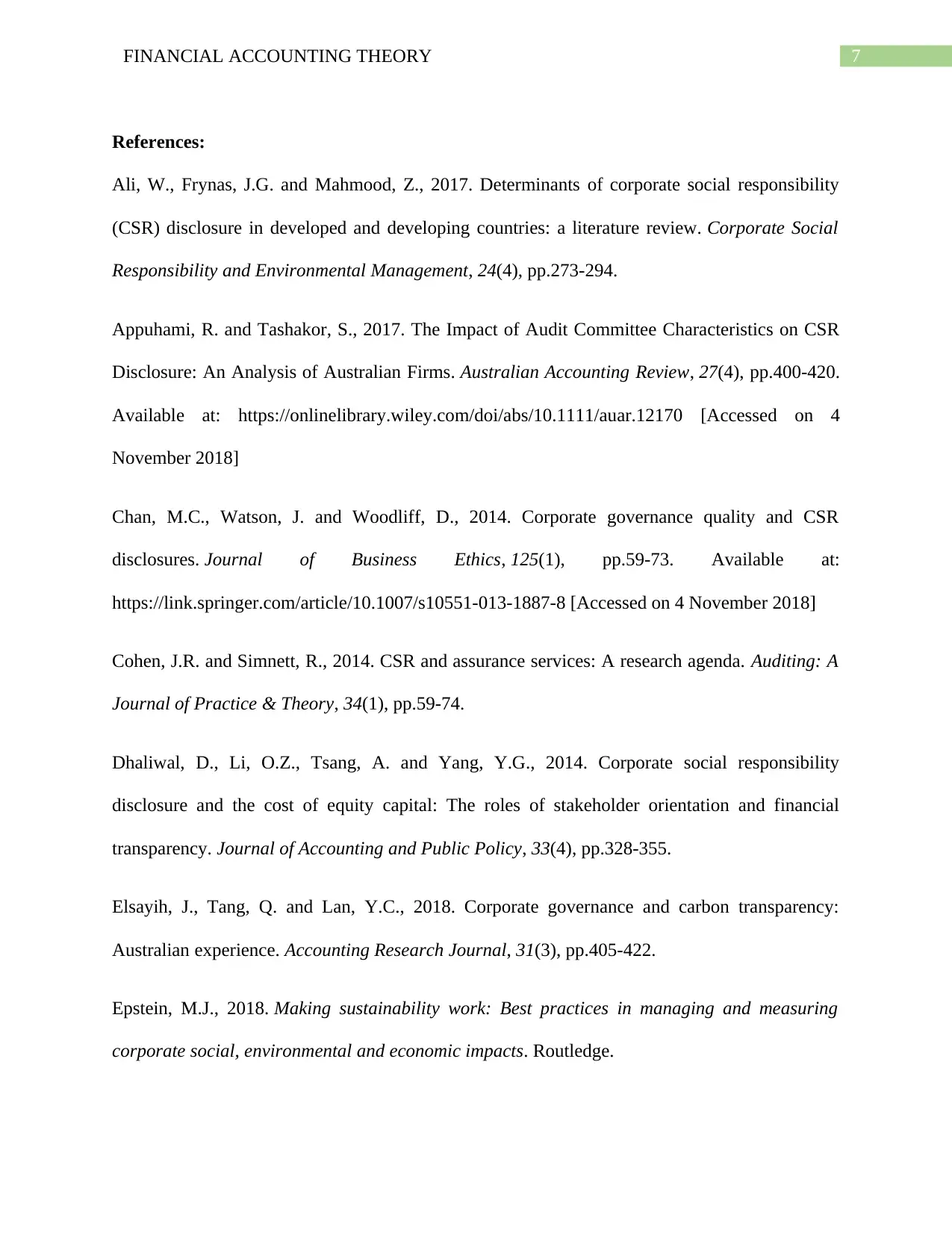
7FINANCIAL ACCOUNTING THEORY
References:
Ali, W., Frynas, J.G. and Mahmood, Z., 2017. Determinants of corporate social responsibility
(CSR) disclosure in developed and developing countries: a literature review. Corporate Social
Responsibility and Environmental Management, 24(4), pp.273-294.
Appuhami, R. and Tashakor, S., 2017. The Impact of Audit Committee Characteristics on CSR
Disclosure: An Analysis of Australian Firms. Australian Accounting Review, 27(4), pp.400-420.
Available at: https://onlinelibrary.wiley.com/doi/abs/10.1111/auar.12170 [Accessed on 4
November 2018]
Chan, M.C., Watson, J. and Woodliff, D., 2014. Corporate governance quality and CSR
disclosures. Journal of Business Ethics, 125(1), pp.59-73. Available at:
https://link.springer.com/article/10.1007/s10551-013-1887-8 [Accessed on 4 November 2018]
Cohen, J.R. and Simnett, R., 2014. CSR and assurance services: A research agenda. Auditing: A
Journal of Practice & Theory, 34(1), pp.59-74.
Dhaliwal, D., Li, O.Z., Tsang, A. and Yang, Y.G., 2014. Corporate social responsibility
disclosure and the cost of equity capital: The roles of stakeholder orientation and financial
transparency. Journal of Accounting and Public Policy, 33(4), pp.328-355.
Elsayih, J., Tang, Q. and Lan, Y.C., 2018. Corporate governance and carbon transparency:
Australian experience. Accounting Research Journal, 31(3), pp.405-422.
Epstein, M.J., 2018. Making sustainability work: Best practices in managing and measuring
corporate social, environmental and economic impacts. Routledge.
References:
Ali, W., Frynas, J.G. and Mahmood, Z., 2017. Determinants of corporate social responsibility
(CSR) disclosure in developed and developing countries: a literature review. Corporate Social
Responsibility and Environmental Management, 24(4), pp.273-294.
Appuhami, R. and Tashakor, S., 2017. The Impact of Audit Committee Characteristics on CSR
Disclosure: An Analysis of Australian Firms. Australian Accounting Review, 27(4), pp.400-420.
Available at: https://onlinelibrary.wiley.com/doi/abs/10.1111/auar.12170 [Accessed on 4
November 2018]
Chan, M.C., Watson, J. and Woodliff, D., 2014. Corporate governance quality and CSR
disclosures. Journal of Business Ethics, 125(1), pp.59-73. Available at:
https://link.springer.com/article/10.1007/s10551-013-1887-8 [Accessed on 4 November 2018]
Cohen, J.R. and Simnett, R., 2014. CSR and assurance services: A research agenda. Auditing: A
Journal of Practice & Theory, 34(1), pp.59-74.
Dhaliwal, D., Li, O.Z., Tsang, A. and Yang, Y.G., 2014. Corporate social responsibility
disclosure and the cost of equity capital: The roles of stakeholder orientation and financial
transparency. Journal of Accounting and Public Policy, 33(4), pp.328-355.
Elsayih, J., Tang, Q. and Lan, Y.C., 2018. Corporate governance and carbon transparency:
Australian experience. Accounting Research Journal, 31(3), pp.405-422.
Epstein, M.J., 2018. Making sustainability work: Best practices in managing and measuring
corporate social, environmental and economic impacts. Routledge.
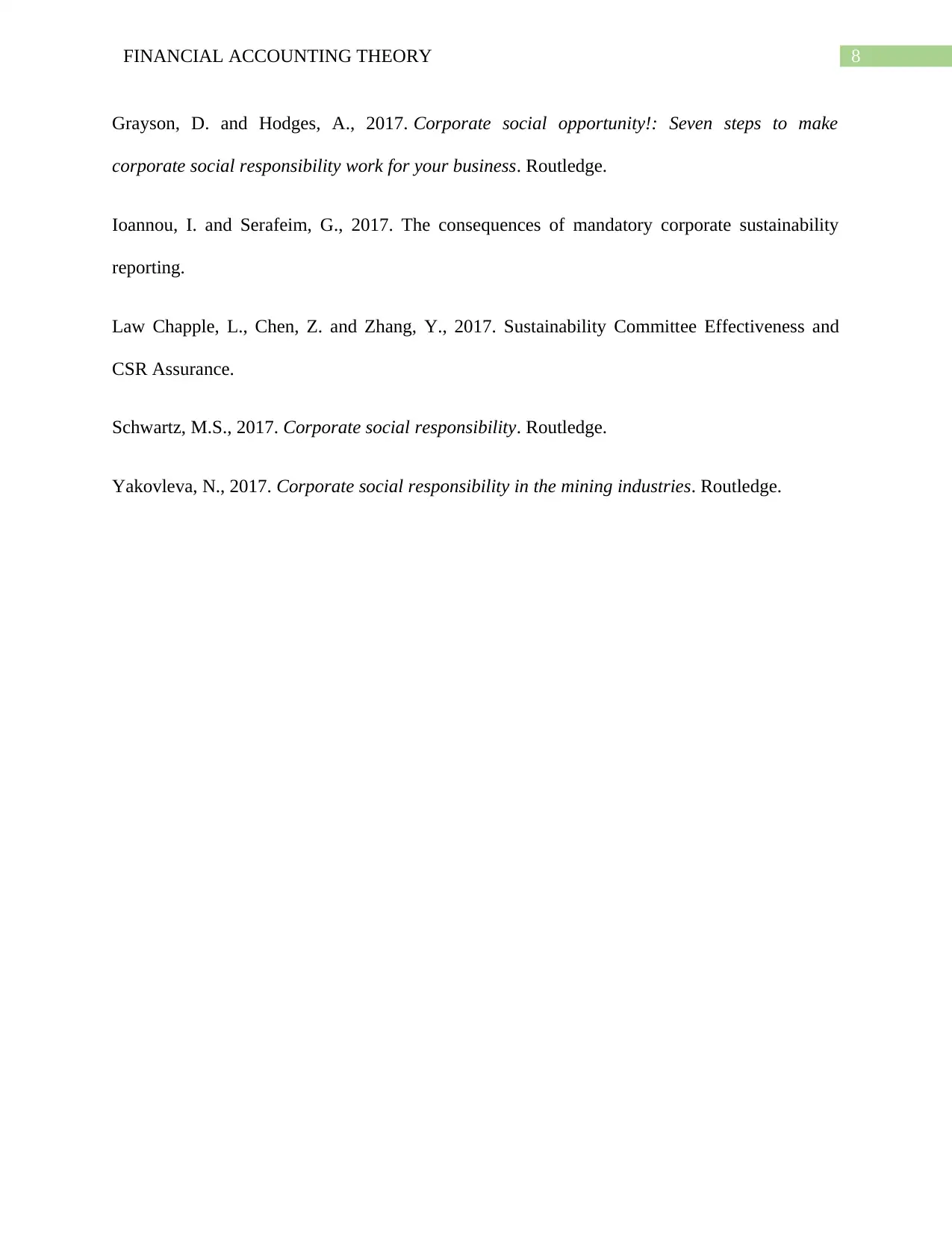
8FINANCIAL ACCOUNTING THEORY
Grayson, D. and Hodges, A., 2017. Corporate social opportunity!: Seven steps to make
corporate social responsibility work for your business. Routledge.
Ioannou, I. and Serafeim, G., 2017. The consequences of mandatory corporate sustainability
reporting.
Law Chapple, L., Chen, Z. and Zhang, Y., 2017. Sustainability Committee Effectiveness and
CSR Assurance.
Schwartz, M.S., 2017. Corporate social responsibility. Routledge.
Yakovleva, N., 2017. Corporate social responsibility in the mining industries. Routledge.
Grayson, D. and Hodges, A., 2017. Corporate social opportunity!: Seven steps to make
corporate social responsibility work for your business. Routledge.
Ioannou, I. and Serafeim, G., 2017. The consequences of mandatory corporate sustainability
reporting.
Law Chapple, L., Chen, Z. and Zhang, Y., 2017. Sustainability Committee Effectiveness and
CSR Assurance.
Schwartz, M.S., 2017. Corporate social responsibility. Routledge.
Yakovleva, N., 2017. Corporate social responsibility in the mining industries. Routledge.
⊘ This is a preview!⊘
Do you want full access?
Subscribe today to unlock all pages.

Trusted by 1+ million students worldwide
1 out of 9
Related Documents
Your All-in-One AI-Powered Toolkit for Academic Success.
+13062052269
info@desklib.com
Available 24*7 on WhatsApp / Email
![[object Object]](/_next/static/media/star-bottom.7253800d.svg)
Unlock your academic potential
Copyright © 2020–2025 A2Z Services. All Rights Reserved. Developed and managed by ZUCOL.





